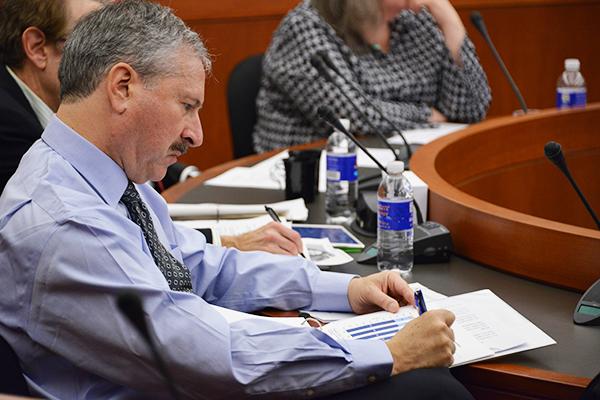More than 100 professors have created a lobbying group to push the Faculty Senate to challenge the administration’s agenda in what has already been one of the most tense years of campus politics in recent history.
Leaders of the Faculty Association have rallied professors out of concern for rising healthcare payments, reliance on adjuncts and the Board of Trustees’ review of faculty bylaws. They also say they want to prod the roughly 40 elected professors who have the ear of top administrators to take on a more adversarial role.
Tyler Anbinder, a history professor who helped form the association, said the Faculty Senate has lost its critical eye when administrators present changes, pointing to lack of debate over this year’s health insurance payment increase.
“We feel like what’s happened is maybe the members of the Faculty Senate have maybe become deferential to the administrators,” Anbinder said. “Usually faculty senates are more independent.”
Faculty Senate members have sparred with top administrators at times this year, convincing the University to abandon plans for a potential campus in China. Still, professors who are part of the Faculty Association say the issues that are most relevant to faculty rarely come up for debate.
Anbinder claimed that the Faculty Senate has empowered top administrators, like University President Steven Knapp, without professors to question them during debates.
Benjamin Hopkins, a history and international affairs professor who helped start the association, said the organization will act as a full-time professor union to counter members of the Faculty Senate.
He said when a core of about 30 faculty protested the rising costs of GW’s health care plan last fall, they realized they shared concerns about plans to revise the faculty code and the growing number of adjunct faculty, as well.
“We are approaching this like academics do, with an open mind, asking where the answers leave us,” he said. “We’re not an agenda-driven organization. We care about the life of the University and act as a forum for faculty to come together.”
The top leadership spots, which has grown to include faculty from 24 departments, are dominated by professors in the humanities. The association is still trying to recruit faculty from across all of GW’s 10 schools.
Still, it will be hard for the organization to appear legitimate to top administrators, Lerman said.
“We don’t have conversations with faculty affiliated with those ad hoc organizations,” he said. “I certainly know faculty who have said they’re associated with that group, but we’ve never had a meeting with them as an organization, nor probably would we.”
Instead, Lerman said he would defer to the Faculty Senate to represent professors’ interests. While there are thousands of professors at GW, only a small group of tenured faculty run for spots on the Faculty Senate.
Often professors will remain on the senate for years, as there is no limit to the number of terms a professor can serve, according to faculty bylaws.

Scheherazade Rehman, the Faculty Senate’s leader, and Charles Garris, the incoming chair of the executive committee, will meet with members of the Faculty Association this week. After that meeting, Rehman said they will judge what kind of relationship the groups will have.
“The discussion at this point is open-ended. We want to discuss the specific concerns of this group and how the Faculty Senate can best assist them,” she said in an email. “One of the important issues that the group is concerned about is the rising costs of the University health-care system for faculty. That particular topic is under discussion currently in the Faculty Senate.”
The senate executive committee also regularly meets without administrators to decide how to represent faculty in discussions.
“While we can have as robust a discussion internally, when we speak to the administration we must speak as one voice,” Rehman wrote in an email to the committee last August, which was obtained by The Hatchet.
The senate’s agenda is planned out with top administrators, and the two sides have dissented at times this year. Last August, Rehman pushed against administrators’ plans to launch a campus in China, halting decision-making until officials addressed faculty questions about academic freedom and costs.
Faculty Senate members have also raised questions about the amount of debt GW has taken out to pay for new construction projects.
Donald Parsons, an economics professor and long-serving Faculty Senate member, said another faculty organization might spark competition that could force the senate to be more effective.
But he warned the Faculty Association might struggle to get off the ground and remain a structured organization. The Faculty Senate has trouble recruiting new members, he said, which is part of the reason so many professors serve for several years in a row.
“I embrace the competition. The pressure to do better makes organizations function better,” he said.
Several professors on the senate said they were frustrated that members of the Faculty Association had not approached them about their complaints.
But Gregory Squires, chair of the sociology department who is a member of both faculty organizations, said that more members would make the Faculty Senate a “more lively body.”
“I think by having people who are more attuned and engaged in the kinds of issues that the association is involved in will help make the senate a more effective body,” Squires said.







